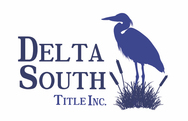
Your Best Decision is
in Our Hands!
Blog
05/07/2025
Buying a property can be a bit confusing at times. If you’re having a challenging time understanding all the real estate terminology used during the process, this post by Delta South Title, Inc. in Mobile, AL will share a basic homebuying glossary.

Buying a home is an exciting journey, but it can also feel overwhelming—especially when you’re bombarded with real estate jargon. From mortgage terms to legal documents, understanding the language of homebuying is essential for making informed decisions. To help you navigate the process with confidence, we’ve put together a basic homebuying glossary of key terms you should know.
Call Delta South Title, Inc. in Mobile, AL, at (251) 633-3133 if you need help with your homebuying glossary or with the real estate process.
Basic Homebuying Glossary
Appraisal
An appraisal is an assessment of a property's value conducted by a licensed appraiser. Mortgage lenders require appraisals to ensure the home is worth the loan amount. If an appraisal comes in lower than the agreed price, the buyer may need to renegotiate or cover the difference.
Closing Costs
Closing costs are the fees and expenses paid at the end of the home purchase. These include lender fees, title insurance, property taxes, and legal fees. Buyers should expect to pay between 2% to 5% of the home’s purchase price in closing costs.
Contingency
A contingency is a condition in a real estate contract that must be met before the sale is finalized. Common contingencies include a home inspection contingency, a financing contingency, and an appraisal contingency.
Credit Score
A three-digit number that represents a buyer’s creditworthiness. Lenders use this score to determine eligibility for a mortgage and the interest rate offered. A higher score generally results in better loan terms.
Debt-to-Income Ratio (DTI)
A percentage that compares a buyer’s monthly debt payments to their gross monthly income. Lenders use DTI to assess whether a borrower can afford a mortgage. Lower ratios make loan approval easier.
Down Payment
The amount a buyer pays upfront toward the home purchase. While 20% is the traditional recommendation, many lenders accept lower down payments, such as 3% to 5% for conventional loans or 0% for VA and USDA loans.
Earnest Money
A deposit made by the buyer to show commitment to the home purchase. This money is typically held in escrow and applied toward closing costs or the down payment. If the buyer backs out for an unapproved reason, they may lose the earnest money.
Escrow
A neutral third-party account where money and documents are held until all conditions of the sale are met. Escrow protects both the buyer and seller by ensuring funds are only released when all agreements are honored.
Home Inspection
A professional evaluation of a property’s condition, including the roof, plumbing, electrical systems, and foundation. Inspections help buyers uncover potential issues before finalizing the purchase.
Homeowners Association (HOA)
An organization that enforces rules and maintains common areas in a community. Buyers purchasing homes in HOA-governed areas must adhere to HOA regulations and pay monthly or annual fees.
Call Delta South Title, Inc. in Mobile, AL, at (251) 633-3133 to get the assistance you require during your real estate process.
Loan Pre-Approval
A preliminary approval from a lender stating how much a buyer qualifies to borrow. Pre-approval involves a credit check and financial assessment, giving buyers a competitive edge in a hot housing market.
Loan Estimate
A document provided by lenders outlining estimated loan terms, including interest rates, monthly payments, and closing costs. Buyers should compare loan estimates from multiple lenders to find the best deal.
Mortgage
A mortgage is a loan used to purchase a home, where the property serves as collateral. Mortgage payments typically include principal, interest, taxes, and insurance (PITI).
Principal
The amount of money borrowed from a lender, excluding interest. Each monthly mortgage payment reduces the principal owed.
Private Mortgage Insurance (PMI)
A fee required for conventional loans when a buyer puts down less than 20%. PMI protects the lender in case of default and is typically included in monthly mortgage payments.
Property Taxes
Annual taxes paid to local governments based on the assessed value of a home. Property taxes help fund schools, infrastructure, and public services.
Real Estate Agent
A licensed professional who helps buyers and sellers navigate real estate transactions. Buyer’s agents advocate for homebuyers by negotiating prices, scheduling inspections, and handling paperwork.
Title
A legal document proving property ownership. Before closing, a title search ensures there are no outstanding claims, disputes, or liens against the property. Buyers typically purchase title insurance to protect against future ownership issues.
Underwriting
The lender’s process of reviewing a borrower’s financial background to determine loan approval. Underwriters assess credit scores, income, assets, and property value.
Zoning Laws
Local government regulations dictating how properties can be used (e.g., residential, commercial, agricultural). Buyers should check zoning laws before purchasing, especially if they plan to build, renovate, or operate a business from home.
Call Delta South Title, Inc. in Mobile, AL, at (251) 633-3133 for professional title services that can help you have a safe and successful closing.
COPYRIGHT © 2024 Delta South Title, Inc.
ALL RIGHTS RESERVED

